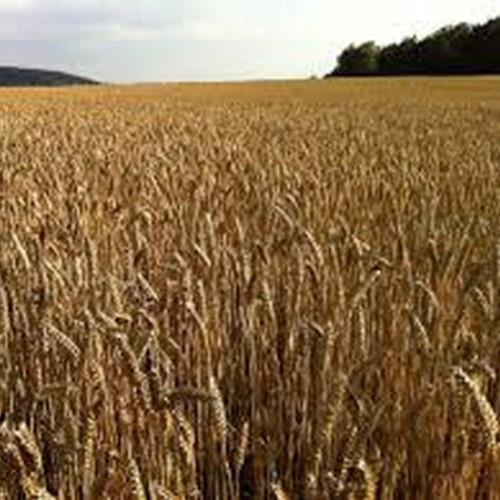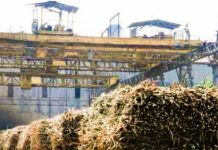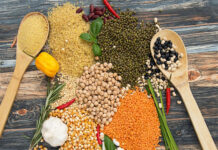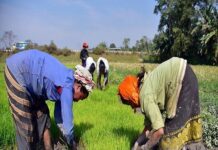For making Aatmanirbhar Bharat, Union Government under the leadership of Prime Minister Shri Narendra Modi is implementing many national programmes to increase production of deficit commodities like oilseeds and pulses besides ensuring food security. Overall strategy is to sustain food security, reduce import dependency and utilize emerging opportunities in agricultural exports. Timely supply of quality seeds of high yielding varieties (HYVs), inputs, latest production technologies, credit, crop insurance, micro-irrigation and post harvest facilities are few of such interventions taken to increase agricultural production and productivity. All these interventions have to large increase in area under rabi crops this year.
Monitoring of rabi crops sowing has shown that momentum gained in sowing of Rabi crops is progressing well. As on 23-12-2022, area sown under rabi crops has increased by 4.37% from 594.62 lakh hectares in 2021-22 to 620.62 lakh hectares in 2022-23. This is 25.99 lakh hectares more this year compared to corresponding period of 2021-22. The increase in area is across all crops; highest being in wheat. Out of 25.99 lakh hectares increase in all rabi crops, increase in wheat area is 9.65 lakh hectares from 302.61 to 312.26 lakh hectares. Though sowing of rabi crops is still under progress, area brought under wheat this year (312.26) till 23-12-2022 is more than normal rabi sown area (304.47) and total sown area of last year (304.70) This increase in wheat area is very assuring in the background of crisis faced by world for wheat availability due to Russia-Ukraine war and for ensuring our own food security. Thus, a record area coverage and production of wheat is expected this year.
Oilseeds production is a major cause of concern as country has to spend heavily on import of edible oils to meet domestic demand. In 2021-22, country has to import 142 lakh tonnes of edible oils at a cost of Rs 1.41 lakh crore. The government focus is on increasing oilseeds production to reduce import dependency in edible oils. Due to renewed focus on oilseeds, area under oilseeds increased from 93.28 lakh hectares during 2021-22 to 101.47 lakh hectares this year. This is a quantum jump of 22.66 lakh hectares over normal sown area of 78.81 lakh hectares. It is even higher than the record area of 93.33 lakh hectare attained during 2021-22. Increase in area under oilseeds at the rate of 9.60% is highest among all crops. This is more than double the rate of increase of 4.37% in all crops together.
Rapeseed & Mustard contributed maximum in increasing oilseeds area during this rabi season. Mustard area increased by 7.32 lakh hectares from 85.35 lakh hectares in 2021-22 to 92.67 lakh hectares in 2022-23. Thus, out of 8.20 lakh hectares increase in area under oilseeds, rapeseed & mustard alone accounted for 7.32 lakh hectares. Area brought under cultivation of rapeseed & mustard till now is markedly higher than normal sown area of 63.46 lakh hectares and record area attained during 2021-22. Implementation of Special Mustard Mission for last 2 years is mainly responsible for renewed interest of farmers in the cultivation of mustard. During last 2 years, area of rapeseed & mustard increased by 17% from 68.56 in 2019-20 to 80.58 lakh ha in 2021-22. During Rabi 2022-23. 26.50 lakh Seed Minikits of HYV having yield potential of more than 20 quintals per hectare were distributed to the farmers in 301 districts of 18 States under the National Food Security Mission- Oilseeds. Latest varieties like RH- 106, RH – 725, RH – 749, RH – 761, CS – 58, CS – 60, Giriraj, Pant Rai-20, GM-3, PDZ -31 having yield potential in the range of 2500-4000 quintals per hectare were distributed. The higher area and productivity will bring quantum jump in oilseeds production and bring down demand for imported edible oils.
Pulse production is being focused to make country self sufficient in these commodities. Special programme under National Food Security Mission nicknamed NFSM ‘TMU370’ has been launched with aim of increasing productivity of 370 districts having less than state average yields of pulses due to lack of good seed and technological interventions. Area under pulses increased by 3.91 lakh hectares from 144.64 to 148.54 lakh hectares. Lentil alone accounted for 1.40 lakh hectares increase out of 3.91 lakh hectares for all pulses. Similarly area under gram cultivation increased by 0.72 lakh hectares. About 4.04 lakh seed minikits of HYVs were distributed under ‘TMU370’ to farmers free of cost for lentil. The high yielding varieties distributed included IPL 220, IPL 315, IPL 316, IPL 526. For urad, 50,000 seed minikits of LBG-787 were distributed among farmers of selected districts.
The United Nations General Assembly has declared the year 2023 as the International Year of Millets. This was adopted by a United Nations Resolution for which India took the lead and was supported by over 70 nations. This will help to create awareness throughout the world of the importance of millets, its role in sustainable agriculture and its benefits as a smart and super food. In order to meet growing demand of millets around world, the Government is promoting millet production through the NFSM-Nutri Cereals component of National Food Security Mission (NFMS) programme in 212 districts of 14 states. Coarse cum Nutri-cereals saw an increase of 2,42 lakh hectares in area under cultivation from 41,50 lakh hectares in 2021-22 to 43,92 lakh hectares in 2022-23 till date. India is at the forefront in celebrating the IYoM in a big way and is poised to become the global hub for the millets. Besides supporting sustainable production, Ministry of Agriculture and Farmers Welfare is creating awareness for higher consumption, developing market and value chain and funding research and development activities.
Under various programmes aimed at ensuring food security and making country Aatmanirbhar in deficit agricultural commodities, assistance is given through state governments to farmers for interventions like cluster demonstrations on improved package of practices, demonstrations on cropping system, distribution of seeds of High Yielding Varieties (HYVs)/hybrids, improved farm machineries/resource conservation machineries/tools, efficient water application tools, plant protection measures, nutrient management/soil ameliorants, processing & post-harvest equipments, cropping system based trainings to the farmers etc. In addition, farmers are provided easy credit, ensured against damage by weather, remunerative prices for their produce and supported through Farmers Producers organization (FPOs) through various government programmes.
Union Government focus on Aatmanirbhar Bharat has laid emphasis on increasing productivity of all crops with focus on crops where demands is met through costly imports like oilseeds and pulses. For this, seed minikits of HYVs are given free of cost to farmers along with technology support and critical inputs. The increased area brought under wheat, oilseeds, pulses and nutri-cereals along with higher productivity due to use of HYV seeds will bring a milestone in food grain production in the country. This will result in bringing self sufficiency in pulses, reducing import of edible oils and meeting global demands for wheat and millets. The farmers of the country will play major role in making country Aatmanirbhar in agriculture.
(Source: PIB)

















